2013新版人教版新目标英语八年级上册Unit1 Where did you go on vacation知识点复习(吴)
八年级新目标上unit_1_Where_did_you_go_on_vacation_知识点
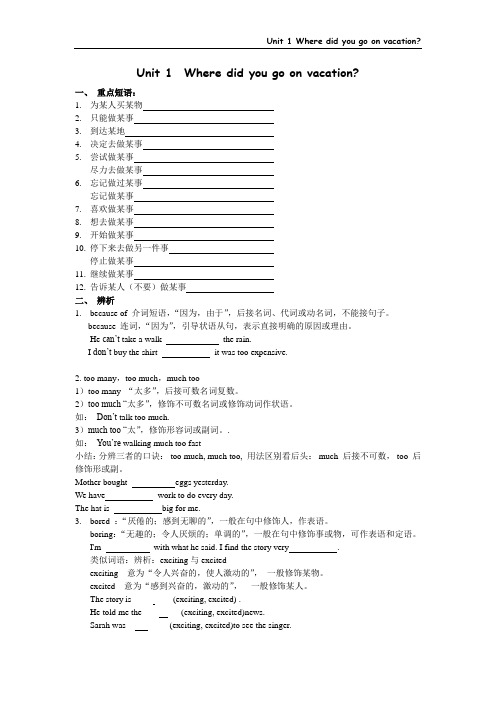
Unit 1 Where did you go on vacation?一、重点短语:1.为某人买某物2.只能做某事3.到达某地4.决定去做某事5.尝试做某事尽力去做某事6.忘记做过某事忘记做某事7.喜欢做某事8.想去做某事9.开始做某事10.停下来去做另一件事停止做某事11.继续做某事12.告诉某人(不要)做某事二、辨析1.because of 介词短语,“因为,由于”,后接名词、代词或动名词,不能接句子。
because 连词,“因为”,引导状语从句,表示直接明确的原因或理由。
He can’t take a walk the rain.I don’t buy the shirt it was too expensive.2. too many,too much,much too1)too many “太多”,后接可数名词复数。
2)too much “太多”,修饰不可数名词或修饰动词作状语。
如:Don’t talk too much.3)much too “太”,修饰形容词或副词。
.如:You’re walking much too fast小结:分辨三者的口诀:too much, much too, 用法区别看后头:much 后接不可数,too 后修饰形或副。
Mother bought eggs yesterday.We have work to do every day.The hat is big for me.3.bored :“厌倦的;感到无聊的”,一般在句中修饰人,作表语。
boring:“无趣的;令人厌烦的;单调的”,一般在句中修饰事或物,可作表语和定语。
I'm with what he said. I find the story very .类似词语:辨析:exciting与excitedexciting 意为“令人兴奋的,使人激动的”,一般修饰某物。
excited 意为“感到兴奋的,激动的”,一般修饰某人。
人教新目标八年级英语上册Unit1Wheredidyougoonvacation知识点讲解
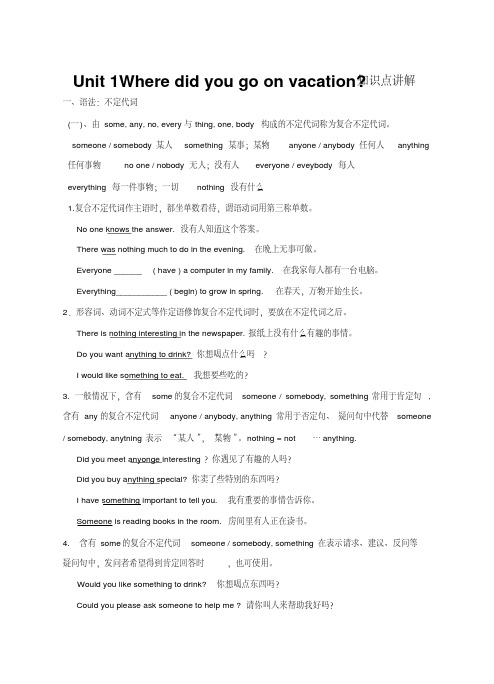
Unit 1Where did you go on vacation?知识点讲解一、语法:不定代词(一)、由some, any, no, every与thing, one, body 构成的不定代词称为复合不定代词。
someone / somebody 某人something 某事;某物anyone / anybody 任何人anything 任何事物no one / nobody 无人;没有人everyone / eveybody 每人everything 每一件事物;一切nothing 没有什么1.复合不定代词作主语时,都坐单数看待,谓语动词用第三称单数。
No one knows the answer. 没有人知道这个答案。
There was nothing much to do in the evening. 在晚上无事可做。
Everyone ______ ( have ) a computer in my family. 在我家每人都有一台电脑。
Everything___________ ( begin) to grow in spring. 在春天,万物开始生长。
2.形容词、动词不定式等作定语修饰复合不定代词时,要放在不定代词之后。
There is nothing interesting in the newspaper.报纸上没有什么有趣的事情。
Do you want anything to drink?你想喝点什么吗?I would like something to eat. 我想要些吃的?3. 一般情况下,含有some的复合不定代词someone / somebody, something常用于肯定句,含有any的复合不定代词anyone / anybody, anything常用于否定句、疑问句中代替someone / somebody, anytning表示“ 某人”,“某物”。
人教新目标八年级上册英语《Unit 1 Where did you go on vacation?》
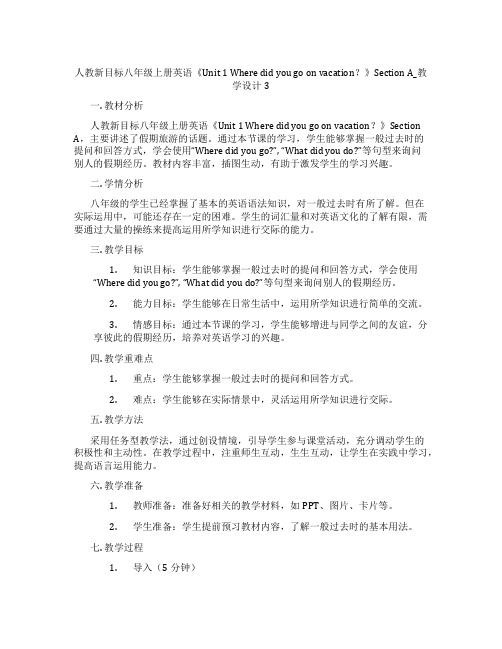
人教新目标八年级上册英语《Unit 1 Where did you go on vacation?》Section A_教学设计3一. 教材分析人教新目标八年级上册英语《Unit 1 Where did you go on vacation?》Section A,主要讲述了假期旅游的话题。
通过本节课的学习,学生能够掌握一般过去时的提问和回答方式,学会使用“Where did you go?”, “What did you do?”等句型来询问别人的假期经历。
教材内容丰富,插图生动,有助于激发学生的学习兴趣。
二. 学情分析八年级的学生已经掌握了基本的英语语法知识,对一般过去时有所了解。
但在实际运用中,可能还存在一定的困难。
学生的词汇量和对英语文化的了解有限,需要通过大量的操练来提高运用所学知识进行交际的能力。
三. 教学目标1.知识目标:学生能够掌握一般过去时的提问和回答方式,学会使用“Where did you go?”, “What did you do?”等句型来询问别人的假期经历。
2.能力目标:学生能够在日常生活中,运用所学知识进行简单的交流。
3.情感目标:通过本节课的学习,学生能够增进与同学之间的友谊,分享彼此的假期经历,培养对英语学习的兴趣。
四. 教学重难点1.重点:学生能够掌握一般过去时的提问和回答方式。
2.难点:学生能够在实际情景中,灵活运用所学知识进行交际。
五. 教学方法采用任务型教学法,通过创设情境,引导学生参与课堂活动,充分调动学生的积极性和主动性。
在教学过程中,注重师生互动,生生互动,让学生在实践中学习,提高语言运用能力。
六. 教学准备1.教师准备:准备好相关的教学材料,如PPT、图片、卡片等。
2.学生准备:学生提前预习教材内容,了解一般过去时的基本用法。
七. 教学过程1.导入(5分钟)通过展示一些假期旅游景点的图片,引导学生谈论自己的假期经历,引出本节课的主题。
2.呈现(5分钟)教师通过PPT展示本节课的主要句型:“Where did you go?”, “What did you do?”等,同时给出相应的回答,让学生感知和理解这些句型的用法。
人教新目标八年级英语上册思维导图课堂笔记Unit 1 Where did you go on vacation

Unit 1 Where did you go on vacation?2013版人教新目标八年级英语上册思维导图课堂笔记1. anyone pron. 任何人I don’t want anyone to touch the book.我不想让任何人碰这本书。
•someone某人2. anywhere adv.在任何地方Did you go anywhere interesting?你去过任何有趣的地方吗?•nowhere无处,哪里都不3. wonderful adj. 精彩的;绝妙的I think the talk shows are wonderful.我认为访谈节目很精彩。
•近:fantastic极好的4. few adj. & pron不多;很少Few of us know the truth.我们当中没有几个人知道真相。
Very few students learn Latin now.现在学拉丁语的学生很少。
•本身含有否定•quite a few极好的•a few一些,有些•little不多的•a little一些,少量的5. most adj.,adv.&pron. 最多的;大多数Most students of these school are girls.这所学校的大多数学生是女生。
Who did most carefully Lucy,Lily or Tom?谁做的最认真露西、莉莉还是汤姆?Most of the students want to study abroad nowadays.如今大多数学生想去国外学习。
•most of the +复数名词/不可数名词•most of +代词(宾语)•most of +物主代词+复数名词/不可数名词•most of …作主语时,谓语动词的数与of后的词在形式上保持一致6. something pron. 某事;某物I want something to eat.我想要一些吃的东西。
人教新目标八年级英语上册Unit1Wheredidyou教案

XX 学校--用心用情 服务教育!用心用情 服务教育 1 《Unit 1 Where did you go on vacation (第一课时)》教学目标:知识目标Words and expressions: (1) anyone anywhere wo nderful few quite a few most something nothing everyone of course myself yourself hen pig seem bored som eone diary (2)go on vacation b uy something special quite a few of course(3) Where did you go on vacation? Did you go out with a nyone?能力目标:掌握一些规则动词和不规则动词的过去式.掌握否定代词的用法.三|情感目标:通过讨论假期,增进学生对国内外风景名胜的认识,热爱大自然,形成积极向上的生活观.语法难点:时间表达法教学过程:不定代词的用法.Step1 Talk about the students ’ vacation. Where did you go on v acation?Did you have a good time?Step 2 Learn new words.Step3. Presentation Learn the following sentences by PPT:Where did you go on vacation? Did you go out with anyone? Did you buy anything speci al?How was the food?Did everyone have a good time?Step4: Listen to 1b and math the activities with the pictures..First let the Ss listen carefully..Then check the answers.Step5: Listen and number the people in the picture.Step6: Listening 2a and complete the chart.. Step7:Listening again . Chec k Yes or No for each question. Finish 2b.Step8: 2d Role-play the conversation.Step 9: Test 完成单词---Lisa, did you go a __________ last weekend?---Yes, I went to Hangzhou with my sister.I bought something for my friends, but n________ for myself. My daughter usually keeps a d_______ every day.The movie isn ’t interesting at all, so I feel b_______ about it. There are f________ students in the classroom. They are all having a P.E. class on the playground.教学后记:。
八年级英语上册一至三单元知识点小结版新目标英语

八年级英语上册一至三单元知识点小结(2013版新目标英语)2013秋季新版八年级上册英语第一至三单元知识点小结Unit1 Where did you go on vacation?vacation 度假vacation意为“假期、假日”,相当于holiday,但vacation表示长的假期。
如:long vacation 长假ummer vacation 暑假as vacation 圣诞假期而holiday(尤其美国)指“假日;休息日;休假”。
vacaliday 意为“度假”2. anythingg 一些有趣的东西1)g,anything,nothing,everything是指物的不定代词。
somebody,someone,anybody,anyone,nobody,everybody,everyone是指人的不定代词。
somewhere,anywhere,nowhere,everywhere是指地点的不定代词。
2)当形容词修饰g, anythingg, everything等不定代词时,放在这些词的后面;3)这些不定代词做主语时,谓语动词用第三人称单数。
如:Is everybody here? 大家都到齐了吗?4)g,somebody,someone,somewhere用于肯定句及表示请求或建议的疑问句中,而anything,anybody,anyone,anywhere用于否定句及疑问句中。
如:Did you do anythingg? 你做了有趣的事吗?(表疑问)Why don’t you vwith me? 你为什么不跟我一起去拜访下某个人呢?(表建议)bub. 或 buy sb如:My pabuy some babub我父母经常给我买书。
4.提建议的句子:①What/ how about +doing sth.? 如:What/ How about goingg?②Why don’t you + do sth.? 如:Why don’t you gg?③Why not + do sth. ? 如:Why not gg?④Let’s + do sth. 如:Let’s gg⑤Shall we/ I + do sth.? 如:Shall we/ I gg?long 好久不见quite a few 相当多a few 与 a little 的区别,few 与 little 的区别⑴ a few 一些修饰可数名词a little 一些修饰不可数名词两者都表肯定意义如:He has a few friends. 他有一些朋友。
新人教版八年级上册英语Units1-10单元知识点归纳

2013年秋人教版新目标八年级上册英语Units1-10单元知识点归纳Unit1 Where did you go on vacation?go on vacation去度假stay at home待在家里go to the mountains去爬山go to the beach去海滩visit museums 参观博物馆go to summer camp去参观夏令营quite a few相当多study for为……而学习go out出去most of the time大部分时间taste good尝起来很好吃have a good time玩得高兴of course当然feel like 给……的感觉;感受到go shopping去购物in the past在过去walk around四处走走because of 因为one bowl of… 一碗……the next day第二天drink tea喝茶find out找出;查明go on继续take photos照相something important重要的事up and down上上下下come up出来buy sth. for sb. / buy sb. sth.为某人买某物taste + adj. 尝起来……look+adj. 看起来……nothing…but+动词原形除了……之外什么都没有seem+〔to be〕+ adj. 看起来……arrive in+大地点/ arrive at+小地点到达某地decide to do sth.决定去做某事try doing sth.尝试做某事/ try to do sth.尽力去做某事forget doing sth.忘记做过某事/ forget to do sth.忘记做某事enjoy doing sth.喜欢做某事want to do sth.想去做某事start doing sth.开始做某事stop doing sth. 停止做某事dislike doing sth. 不喜欢做某事keep doing sth.继续做某事Why not do. sth.?为什么不做……呢?so+adj.+that+从句如此……以至于……tell sb. (not) to do sth. 告诉某人〔不要〕做某事Unit2 How often do you exercise?help with housework帮助做家务on weekends在周末how often多久一次hardly ever几乎从不once a week每周一次twice a month每月两次every day每天 be free有空go to the movies去看电影use the Internet用互联网swing dance摇摆舞play tennis打网球stay up late熬夜;睡得很晚at least至少have dance and piano lessons上舞蹈课和钢琴课go to bed early早点睡觉play sports进行体育活动be good for对……有好处go camping去野营not…at all一点儿也不……in one’s free time在某人的业余时间the most popular 最受欢送的such as比方;诸如old habits die hard积习难改go to the dentist去看牙医morn than多于;超过less than少于help sb. with sth.帮助某人做某事How about…? ......怎么样?/ ……好不好?want sb. to do sth.想让某人做某事How many+可数名词复数+一般疑问句?……有多少……?主语+find+that从句. ……发现……spend time with sb.和某人一起度过时光It’s+ adj.+ to do sth.做某事的……的。
最新人教新目标英语八年级上册 Unit 1 Where did you go on vacation?单元知识归纳

Unit 1 Where did you go on vacation?单元知识目标突破词汇SectionAanyone pron.任何人→P3SectionBfeel like给……的感觉;感受到→P10quite a few 相当多;不少→P3building n.建筑物;房子→P10wonder v. 想知道;琢磨→P11most adj.,adv. &pron. 最多;大多数→P4difference n.差别;差异→P11wait v.&n. 等待;等候→P12 seem v. 好像;似乎;看来→P4because of 因为→P12bored adj. 厌倦的;烦闷的→P5below prep.&adv. 在……下面;到……下面→P13SectionBactivity n. 活动→P9enough adj. 足够的;充足的;充分的→P13 decide v. 决定;选定→P9try v.& n. 尝试;设法;努力→P9dislike v.&n.不喜爱;厌恶→P14把握句型1.I felt like I was a bird.我感觉像是一只鸟。
feel like后接的是宾语从句。
2.I wonder what life was likehere in the past.我很想知道过去这儿的生活是什么样的。
注意wonder的用法。
3.What a difference a day makes!一天的差别有多大!注意感叹句。
4.And because of the badweather,we couldn't seeanything below.因为这恶劣天气,我们看不到下面的任何景色。
注意because of的运用。
熟悉语法学习不定代词的用法。
规则动词和不规则动词的过去式。
学会交际学会询问度假情况的交际用语。
写作练笔记叙假期发生的事情。
课文翻译Section A 2dRick:Hi,Helen. Long time no see.Helen:Hi,Rick. Yes,I was on vacation last month.Rick:Oh,did you go anywhere interesting?Helen:Yes,I went to Guizhou with my family.Rick:Wow!Did you see Huangguoshu Waterfall?Helen:Yes,I did. It was wonderful!①We took quite a few photos there. What about you?Did you do anything special last month?Rick:Not really.②I just stayed at home most of the time to read and relax.,里克:你好,海伦。
英语人教新目标八年级上册(2013年新编)Unit 1 Where did you go on vacation?Section A 教案

Unit 1 Where did you go on vacation?Section A 教案1 (1a-2d)一、教学目标1. 语言知识目标1) 能掌握以下单词:anyone, anywhere, wonderful, quite a few, most, something, nothing, everyone, of course, myself, yourself…2)能掌握以下句型:①— Where did you go on vacation? —I went to the mountains.②— Where did Tina to on vacation? —She went to the beach.③— Did you go with anyone? —Yes, I did./No,I didn’t.3) 能了解以下语法:—复合不定代词someone, anyone, something, anything 等的用法。
—yourself, myself等反身代词的用法。
4)一般过去时态的特殊疑问句,一般疑问句及其肯定、否定回答。
2. 情感态度价值观目标:学会用一般过去时进行信息交流,培养学生的环保意识,热爱大自然。
二、教学重难点1. 教学重点1) 用所学的功能语言交流假期去了什么旅行。
2) 掌握本课时出现的新词汇。
2. 教学难点1) 复合不定代词someone, anyone, something, anything等的用法。
2) yourself, myself等反身代词的用法。
三、教学过程Ⅰ. Lead-in看动画片来进入本课时的主题谈论上周末做了些什么事情,谈论过去发生的事情。
Ⅱ. Presentation1. Show some pictures on the big screen. Let Ss read the expressions.2. Focus attention on the picture. Ask: What can you see? Say: Each picture showssomething a person did in the past. Name each activity and ask students to repeat:Stayed at home, Went to mountains, went to New York City 6. Went to the beach,visited my uncle, visited museums, went to summer camp 3. Now, please match each phrase with one of the pictures next to the name of theactivity,point to the sample answer.4. Check the answers. Answers: 1. f 2. b 3. g 4. e5. c6. a7. dIII. Listening1. Point to the picture on the screen.Say: Look at the picture A. Where did Tina go on vacation? She went to mountains.Ask: What did the person do in each picture?2. Play the recording the first time.3. Play the recording a second time.Say: There are three conversations. The people talk about what did on vacation. Listen to the recording and write numbers of the names in the right boxes of the picture.4. Check the answers.IV. Pair works1. Point out the sample conversation. Ask two Ss to readthe conversation to the class.2. Now work with a partner. Make your own conversation about the people in the picture.3. Ss work in pairs. As they talk, move around the classroom and give any help they need.4. Let some pairs act out their conversations.V. Listening1. Tell Ss they will hear a conversation about three students’ conversations. Listen for the first time and fill in the chart. Then listen again and check Yes, or No.2. Let Ss read the phrases in the chart of 2b.3. Play the recording the first time. Ss listen and fill in the chart.4. Play the recording a second time for the Ss to check “Yes, I did.” or “No, I didn’t.”5. Check the answers with the Ss.VI. Pair works1. Let two Ss read the conversation between Grace, Kevin and Julie.2. Let Ss work in pairs and try to role-play the conversation.3. Ask some pairs to act out their conversations. VII. Role-play1. First let Ss read the conversation and match the people and places they went.2. Let Ss act out the conversations in pairs.3. Some explanations in 2d.四、Homework:用英语询问你的一位好朋友,她(他)假期去了哪里?看到了什么?并将此对话写在作业上。
2013新目标八年级上册Unit1_where_did_you_go_on_vacation_SectionA2(3a-3c)
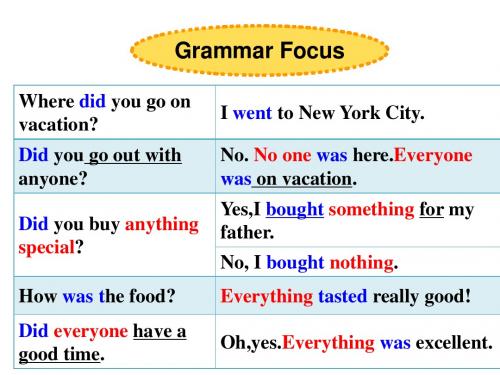
如:
Is everyone here today? 今天,大家都到齐了吗?
Nothing is difficult if you put your heart into it. 世上无难事,只怕有心人。 Nobody/No one knows his name
There is something or somebody near us.(作主语)
• He wants something to drink.
Exercise:
1. –Jack, is there __________in today’s newspaper? A --No, nothing. A. anything important B. something important C. important anything D. important something
D 2. ---Do you have ______to say for yourself? --- No, I have _________to say. A. something; everything B. nothing; something C. everything; anything D . anything; nothing 解析:问句是一般疑问句,anything 用于疑问句 或否定句中代替something ;由答语“No ”可 知“我没什么可说的”,故用nothing,因此选D。
3a
Fill in the blanks with the words in the box And practice the conversation
Linda: Did you do________ fun on your vacation, Alice? anything Alice: yes, I did. I went to Sanya. anyone Linda: How did you like it? something Alice: Well, it was my first time there. So __________ was really interesting. anything everything everything anyone Linda: Did you go with__________? Alice: Yes, I did. I went with my sister. nothing Linda: Did you go shopping? Alice: Of course. I bought _________ for my parents, but something __________ for myself. nothing anything Linda: Why didn‟t you buy__________ for yourself? Alice: I didn‟t really see anything I liked. _________
人教新目标八年级上册英语《Unit 1 Where did you go on vacation?》

人教新目标八年级上册英语《Unit 1 Where did you go on vacation?》Section B_教学设计1一. 教材分析人教新目标八年级上册英语《Unit 1 Where did you go on vacation?》Section B 主要讲述了假期旅行的主题。
通过本节课的学习,学生能够掌握一般过去时的疑问句和回答,以及如何描述过去发生的事情。
教材内容贴近学生的生活,激发学生对旅行的兴趣,提高学生的口头表达能力。
二. 学情分析八年级的学生已经掌握了基本的英语语法知识,具有一般现在时和一般过去时的基础。
在学习本节课之前,学生已经学习了如何用英语描述家庭成员和询问他们的去向。
因此,学生在学习本节课时,能够将已有的知识与新的知识相结合,提高学习效果。
三. 教学目标1.知识目标:–能够听懂、说出一般过去时的疑问句和回答。
–能够用英语描述过去发生的事情。
2.能力目标:–能够与他人用英语交流关于假期旅行的经历。
–能够提高口头表达能力。
3.情感目标:–激发学生对旅行的兴趣,拓宽视野。
–培养学生的团队协作精神。
四. 教学重难点•一般过去时的疑问句和回答。
•如何用英语描述过去发生的事情。
•一般过去时疑问句的构成和用法。
•如何在实际交流中运用一般过去时。
五. 教学方法1.情境教学法:通过设置旅行相关的情境,让学生在实际语境中学习英语。
2.交际法:鼓励学生参与课堂互动,提高学生的口头表达能力。
3.任务型教学法:通过小组合作完成任务,培养学生的团队协作精神。
六. 教学准备1.教学课件:制作与旅行相关的课件,包括图片、视频等。
2.教学道具:准备一些与旅行相关的实物道具,如地图、行李箱等。
3.小组活动准备:划分学习小组,提前分配任务。
七. 教学过程1.导入(5分钟)–教师展示一张旅行图片,引导学生谈论旅行的话题。
–学生分享自己最喜欢的旅行地点和经历。
2.呈现(10分钟)–教师通过课件呈现一般过去时的疑问句和回答。
新版(2013年秋)新目标英语8上Unit1Where_did_you_go_on_vacationSectionB
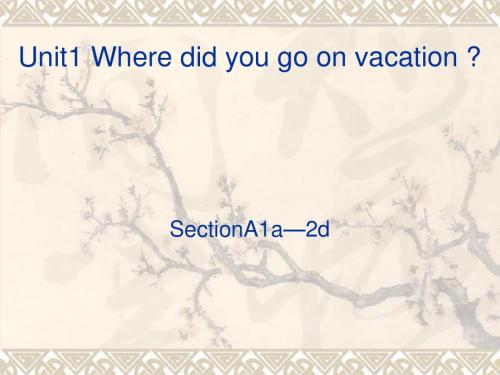
3.No one seemed to be bord. 没有人好像无聊。 1)翻译:___________________ 似乎,好像 2)Seem是系动词,意为______,其用法如下: a.seem +(to be )名词/形容词(作表语) He seems to be happy. b.Seem +to do sth.The students seemed to understand the word. c.It seems that从句。It seems that he is happy.
含-body的复合不定代词与含-one的复合不定代词在功能和意义上 完全相同,可以互换。只是用-body时显得较通俗些,多用于口语 中,用-one时显得较文雅些,更常见于正式场合及书面语中。
复合不定代词都具有单数的含义,因此通常被 看成是单数第三人称。当它们充当句子的主语 时,其后的谓语动词用单数形式。 如:
3a.Fill in the blanks with the words in the words in the box and practice. anyone something anything everything nothing
anything Linda:Did you do__1_____fun on your vacation,Alice? Alice:Yes,Idid.Iwent to Sanya. Linda: How did you like it? everything Alice:Well,it was my first time there, so__2___was really interesting. anyone Linda:Did you go with__3_____? Alice:Yes, Idid.I went with my sister. Linda:Did you go shopping? nothing something Alice:Of course!I bought___4___for my parents,but___5____for myself. anything Linda:Why didn’t you buy __6_____for yourself? anything Alice:Ididn’t really see___7_____I liked.
人教新目标八年级英语上册思维导图课堂笔记Unit 1 Where did you go on vacation

单数反身代词 myself
yourself himself herself
itself
复数反身代词 ourselves yourselves
Section A
themselves
1. enjoyable adj. 有乐趣的,令人愉快的
I don’t think that movie is very enjoyable.
• nothing but
仅仅,只
• have nothing to do 无事可做
• have thing to do with… 与……无关
nothing, something等不定代词 与形容词或副词连用时,应放在 形容词或副词的前面。
Section A
8. everyone pron. 每人;人人;所有人
有东西尝起来都非常好吃。
Section A
7. Did everyone have a good time?
每个人都玩得开心吗?
Section A
8. I bought something for my parents, but nothing for myself. 我为我父母买了一些东西,但是没为我自己买东西。
• yourself • himself • herself • itself • ourselves
你自己 他自己 她自己 它自己 我们自己
Section A
10. seem v. 好像;似乎;看来
I seem to have a cold.
我好像感冒了。
It seems that they know what they are doing. 看来他们知道自己在干什么。
2. anywhere
2013年新版新目标英语人教版八年级上册单词表

新版2013年新目标八年级上册单元英语单词Unit1 Where did you go on vacation? anyone ['eniwʌn] pron. 任何人anywhere ['eniweə(r)] adv.任何地方n.任何(一个)地方wonderful ['wʌndəfl] adj.精彩的;极好的few [fjuː] adj.很少的;n.少量most [məʊst] adj.最多的;大多数的;something ['sʌmθɪŋ] pron.某事物;nothing(=no t…anything) ['nʌθɪŋ] pron.没有什么n.没有myself [maɪ'self] pron.我自己everyone ['evriwʌn] pron.每人;人人yourself [jɔː'self] pron.你自己;你亲自hen [hen] n.母鸡;雌禽bored [bɔːd] adj.无聊的;厌烦的;郁闷的pig n.猪diary ['daɪəri] n.日记;日记簿(keep a diary)seem [siːm] vi.似乎;好像someone ['sʌmwʌn] pron.某人;有人quite a few相当多;不少(后接可数名词)of course [əvkɔːs] 当然activity [æk'tɪvəti] n.活动;活跃decide [dɪ'saɪd] v.决定;选定(decide to do sth.)try [traɪ] v.尝试;设法;努力(try to do sth. /try doing sth.)bird [bɜːd] n.鸟;禽paragliding ['pærəɡlaɪdɪŋ] n.空中滑翔跳伞bicycle ['baɪsɪkl] n.自行车building ['bɪldɪŋ] n.建筑物trader ['treɪdə(r)] n.商人;商船wonder ['wʌndə(r)] v.惊奇;想知道;怀疑difference ['dɪfrəns] n.差异;不同top [tɒp] n.顶部;顶wait [weɪt] v.等;等待(wait for)umbrella [ʌm'brelə] n.伞;雨伞wet [wet] adj.湿的;雨天的below [bɪ'ləʊ] prep.低于;在...下面adv.在下面as [əz] conj.如同;像...一样enough [ɪ'nʌf] adj.足够的adv.足够地;充分地duck [dʌk] n.鸭肉;鸭hungry(反full) ['hʌŋɡri] adj.饥饿的;渴望的feel like(doing sth.)想要dislike [dɪs'laɪk] v.不喜欢;厌恶n.不喜爱;厌恶;反感because of因为;由于have a good time=enjoy oneself=have fun(doing sth.)玩得痛快Unit2 How often do you exercise? housework ['haʊswɜːk] n.家务劳动hardly ['hɑːdli] adv.几乎不;简直不;刚刚ever ['evə(r)] adv.曾经;在任何时候once [wʌns] adv.一次;曾经twice [twaɪs] adv.两倍;两次Internet ['ɪntənet] n.因特网program ['prəʊɡræm] n.节目;程序;课程;节目单full [fʊl] adj.满的;充满的;完全的swing [swɪŋ] n.摇摆;秋千v.摇摆;旋转maybe ['meɪbi] adv.或许;也许;可能swing dance摇摆舞least [liːst] adj.最小的;最少的at least至少hardly ever很少;几乎从不;难得junk n.垃圾;废旧杂物coffee ['kɒfi] n.咖啡;咖啡色health [helθ] n.健康;人的身体或精神状态result [rɪ'zʌlt] .结果;后果percent [pə'sent] adj.百分之...的online [ˌɒn'laɪn] adj.在线的adv.在线地television ['telɪvɪʒn] n.电视机;电视节目although [ɔːl'ðəʊ] conj.虽然;尽管;然而;可是through [θruː] prep.穿过;凭借;一直到body ['bɒdi] n.身体mind [maɪnd] .头脑;想法;意见;心思such [sʌtʃ] adj.这样的;如此的together [tə'ɡeðə(r)] adv.共同;一起die [daɪ] v.死;枯竭;消失writer ['raɪtə(r)] n.作者;作家dentist ['dentɪst] n.牙科医生magazine ['mæɡəziːn] n.杂志however [haʊ'evə(r)] adv.然而;无论如何;不管多么than [ðən] conj.比almost ['ɔːlməʊst] adv.几乎;差不多none [nʌn] pron.没有人;没有任何东西,毫无less [les] adj.更少的;较少的point [pɔɪnt] n.看法;要点;重点;小数点;目标;分数such as例如;诸如junk food n.垃圾食品;无营养食品more than超过;多于;不仅仅;非常less than不到;少于Unit3 I'm more outgoing than my sister. outgoing ['aʊtɡəʊɪŋ] adj.外向的better ['betə(r)] adj.更好的;较好的adv.更好地loudly ['laʊdli] adv.大声地;高声地;花俏地quietly ['kwaɪətli] adv.安静地;悄悄地;平静地hard-working [hɑːd'wɜːkɪŋ] adj.勤勉的;努力工作的competition [ˌkɒmpə'tɪʃn] n.竞争;比赛fantastic [fæn'tæstɪk] adj.极好的;了不起的which adj.哪一个;哪一些pron.哪一个;哪些clearly ['klɪəli] adv.清楚地;显然地win [wɪn] v.赢;赢得;获胜;获得n.胜利though conj.虽然;尽管;adv.不过care about关心talented ['tæləntɪd] adj.有才能的;有天赋的truly ['truːli] adv.真实地;真诚地;正确地care [keə(r)] v.关心;担忧;照顾;在乎serious ['sɪəriəs] adj.严肃的;严重的;庄重的mirror ['mɪrə(r)] n.镜子;反映necessary ['nesəsəri] adj.必要的;必然的both [bəʊθ] adj.两者都pron.两者should [ʃəd] aux.应该;可能;应当;将要touch [tʌtʃ] vt.触摸;感动reach [riːtʃ] v.到达;伸出;达成;取得联系;延伸;(伸手)去够heart [hɑːt] n.心脏;内心fact [fækt] n.事实;真相;实际break [breɪk] v.打碎;折断;违背;解决;中断laugh [lɑːf] v.发笑;笑;嘲笑n.笑声;笑;笑料similar ['sɪmələ(r)] adj.类似的share [ʃeə(r)] vt.分享,共享;分配;共有loud [laʊd] adj.大声的;adv.大声地;响亮地primary ['praɪməri] adj.最初的,最早的be different from和...不同information [ˌɪnfə'meɪʃn] n.信息;情报;资料;通知as long as只要bring out拿出;推出the same as与...同样的in fact事实上;实际上;确切地说be similar to类似于;与...相似Unit4 What's the best movie theater? theater ['θɪətə] n.剧场;电影院;戏院comfortable ['kʌmftəbl] adj.舒适的;充裕的seat [siːt] n.座位;screen [skriːn] n.屏幕;银幕close [kləʊs] v.关;合拢;不开放;停业worst [wɜːst] adj.最坏的;最差的cheaply ['tʃiːpli] adv.廉价地;粗俗地song [sɒŋ] n.歌曲;歌唱choose [tʃuːz] v.选择;决定carefully ['keəfəli] adv.小心地,认真地reporter [rɪ'pɔːtə(r)] n.记者fresh [freʃ] adj.新鲜的;清新的comfortably ['kʌmftəbli] adv.舒服地;容易地;充裕地worse [wɜːs] adj.更坏的;更差的service ['sɜːvɪs] n.服务pretty ['prɪti] adv.相当地adj.漂亮的menu ['menjuː] n.菜单act [ækt] v.行动;表演meal [miːl] n.一餐;膳食so far到目前为止;迄今为止no problem没什么;不客气creative [kri'eɪtɪv] adj.创造的,创造性的;performer [pə'fɔːmə(r)] n.表演者;执行者talent ['tælənt] n.天赋;才能,才艺;common ['kɒmən] adj.常见的;共同的;普通的magician [mə'dʒɪʃn] n.魔术师;术士beautifully ['bjuːtɪfli] adv.美丽地;完美地;role [rəʊl] n.作用;角色winner ['wɪnə(r)] n.获胜者prize [praɪz] n.奖品;奖金everybody ['evribɒdi] pron.每人;人人example [ɪɡ'zɑːmpl] n.例子;榜样poor [pɔː(r)] adj.可怜的;贫穷的seriously ['sɪəriəsli] 严重地,严肃地give [ɡɪv] v.给;赠予;送crowded ['kraʊdɪd] adj.拥挤的have…in common有相同特征all kinds of各种各样;各种类型be up to是…….的职责;由…….决定play a role发挥作用;有影响makeup编造for example例如take…seriously认真对待Unit5 Do you want to watch a game show? sitcom ['sɪtkɒm] n.情景喜剧(= situation comedy)news [njuːz] n.新闻;消息soap [səʊp] n.肥皂;肥皂剧educational [ˌedʒu'keɪʃənl] adj.教育的;有教育意义的plan [plæn] n.计划;方法v.打算;计划hope [həʊp] .希望;期望;盼望n.希望discussion [dɪ'skʌʃn] n.讨论;谈论stand [stænd] v.站立;忍受happen ['hæpən] vi.发生;碰巧;出现;偶遇may [meɪ] aux.可以,能够;可能,也许expect [ɪk'spekt] v.预期;期待;盼望joke [dʒəʊk] n.笑话;玩笑v.说笑话;开玩笑comedy ['kɒmədi] n.喜剧;滑稽;幽默事件find out查明、弄清meaningless ['miːnɪŋləs] adj.无意义的;不重要的action ['ækʃn] n.行为;活动cartoon [kɑː'tuːn] n.卡通;漫画culture ['kʌltʃə(r)] n.栽培;文化;教养famous ['feɪməs] adj.著名的;有名的appear [ə'pɪə(r)] vi.出现;出版;显得become [bɪ'kʌm] v.变成;成为rich [rɪtʃ] adj.富有的;富饶的;丰富的successful [sək'sesfl] adj.成功的;圆满的might [maɪt] aux.可能;也许;may的过去式main [meɪn] adj.主要的;最重要的reason ['riːzn] n.原因;理由film [fɪlm] n.电影unlucky [ʌn'lʌki] adj.倒霉的;不幸的;不吉利的lose [luːz] vt.丢失;失败vi.失败ready ['redi] adj.准备好的;乐意的character ['kærəktə(r)] n.个性;品质;人物;simple ['sɪmpl] adj.简单的;朴素的;单纯的;笨的army ['ɑːmi] n.军队;陆军;一大批action movie动作片be ready to愿意迅速做某事dress up装扮;乔装打扮take sb.’s place代替;替换do a good job工作干得好;做得好Unit6 I'm going to study computer science. doctor ['dɒktə(r)] 医生engineer [endʒɪ'nɪr] 工程师violinist [ˌvaɪə'lɪnɪst] 小提琴手pilot ['paɪlət] 飞行员pianist ['pɪənɪst] 钢琴家scientist ['saɪəntɪst] 科学家college ['kɑːlɪdʒ] 大学education [ˌedʒu'keɪʃn] 教育medicine ['medsn] 药,医学university [ˌjuːnɪ'vɜːrsəti] 大学,高等学府article ['ɑːrtɪkl] 文章,论文send [send] 邮寄,发送grow up长大成长computer programmer计算机管理员be sure about确信make sure确保resolution [ˌrezə'luːʃn] 决心,决定foreign ['fɔːrən] 外国的able [ˌebəl] 能够discuss [dɪˌskʌs] 讨论,商量promise [ˌprɑmɪs] 承诺,诺言beginning [bɪˌɡɪnɪŋ] 开头,开端improve [ɪmˌpruv] 改进,改善physical ['fɪzɪkl] 身体的self-improvement [selfɪmp'ruːvmənt] 自我改进,自我提高hobby ['hɑːbi] 业余爱好own [oʊn] 自己的,本人的,拥有personal ['pɜːrsənl] 个人的,私人的relationship [rɪ'leɪʃnʃɪp] 关系write down写下have to do with关于;与……有关系take up学着做;开始做agree with同意be able to能够做某事Unit 7 Will people have robots?paper ['peɪpər] 纸pollution [pə'luːʃn] 污染;污染物prediction [prɪ'dɪkʃn] 预测future ['fjuːtʃər] 未来pollute [pə'luːt] 污染environment [ɪn'vaɪrənmənt] 环境planet ['plænɪt] 行星earth [ɜːrθ] n.地球;泥土plant [plænt] 种植,植物part [pɑːrt] 参加,部分peace [piːs] 和平sky [skaɪ] 天空play apart参与astronaut ['æstrənɔːt] 宇航员apartment [ə'pɑːrtmənt] 公寓房间rocket ['rɑːkɪt] 火箭;space [speɪs] .空间;太空even ['iːvn] 甚至;愈加human ['hjuːmən] 人的;n.人;人类servant ['sɜːrvənt] 仆人dangerous ['deɪndʒərəs] 危险的already [ɔːl'redi] 已经factory ['fæktri] 工厂believe [bɪ'liːv] 相信disagree [ˌdɪsə'ɡriː] 不同意shape [ʃeɪp] 形状fall [fɔːl] 倒塌;跌倒possible ['pɑːsəbl] 可能的probably ['prɑːbəbli] 大概;或许;很可能holiday ['hɑːlədeɪ] 假日word [wɜːrd] 单词;space station太空站over and over again多次;反复地hundreds of许多;大量;成百上千fall down突然倒下;跌倒;倒塌look for寻找;寻求Unit 8 How do you make a banana milk shake? blender ['blendər] 搅拌器;果汁机peel [piːl] vt.剥落;削皮pour [pɔːr] pour [pɔːr] 倒;倾倒yogurt ['joʊɡərt] 酸奶;honey ['hʌni] 蜂蜜watermelon ['wɔːtərmelən] 西瓜spoon [spuːn] 勺,调羹add [æd] 增加finally ['faɪnəli] 最后,最终salt [sɔːlt] 盐sugar ['ʃʊɡər] 糖cheese [tʃiːz] 干酪,奶酪popcorn ['pɑːpkɔːrn] 爆米花corn [kɔːrn] 玉米,谷物machine [mə'ʃiːn] 机器sandwich ['sænwɪtʃ] 三明治butter ['bʌtər] 黄油,奶油turkey ['tɜːrki] 火鸡lettuce ['letɪs] 莴苣,生菜piece [piːs] 件;篇;片;块;traditional [trə'dɪʃənl] 传统的traveler ['trævlə] 旅行者England ['ɪŋɡlənd] 英格兰;英国celebrate ['selɪbreɪt] 庆祝;庆贺pepper ['pepər] 胡椒粉;辣椒oven ['ʌvn] 烤箱;烤炉cover ['kʌvər] 遮盖,盖子,gravy ['ɡreɪvi] 肉汁;肉汤serve [sɜːrv] 接待,服务temperature ['temprətʃər] 温度,气候Unit 9 Can you come to my party? prepare [prɪ'per] v.预备;准备exam [ɪɡ'zæm] 考试available [ə'veɪləbl] 可得到的;有空的;hang [hæŋ] 悬挂;(使)低垂until [ən'tɪl] 直到...的时候;直到…为止catch [kætʃ] 赶上;抓住;捕捉invite [ɪn'vaɪt] 邀请accept [ək'sept] 接受;refuse [rɪ'fjuːz] 拒绝invitation [ˌɪnvɪ'teɪʃn] 邀请;邀请函reply [rɪ'plaɪ] 回答,回复forward ['fɔːrwərd] 转交;发送,向前的delete [dɪ'liːt] 删除preparation [ˌprepə'reɪʃn] 准备,准备工作opening ['oʊpnɪŋ] 开幕式,落成典礼guest [ɡest] 客人concert ['kɑːnsərt] 音乐会headmaster [ˌhed'mæstər] 校长event [ɪ'vent] 大事,公开活动calendar ['kælɪndər] 日历,日程表Unit10 If you go to the party,you 'll have a great time! video ['vɪdioʊ] 录像,录像带organize ['ɔːrɡənaɪz] 组织,筹备chocolate ['tʃɑːklət] 巧克力upset [ʌp'set] 难过,失望advice [əd'vaɪsɪ] 劝告,建议travel ['trævl] 旅行agent ['eɪdʒənt] 代理人,经纪人expert ['ekspɜːrt] 专家,能手teenager ['tiːnˌeɪdʒə] 青少年normal ['nɔːrml] 正常的unless [ən'les] 除非,如果不certainly ['sɜːrtnli] 当然,肯定wallet ['wɑːlɪt] 皮夹,钱包worried ['wɜːrid] 担心的,烦恼的angry ['æŋɡri] 生气的,发怒的careless ['kerləs] 粗心的,不小心的understanding [ˌʌndər'stændɪŋ] 善解人意的,体谅人的trust [trʌst] 相信,信任mistake [mɪ'steɪk] 错误,失误careful ['kerfl] 小心的,细致的advise [əd'vaɪz] v劝告,建议solve [sɑːlv] 解决;解答experience [ɪk'spɪriəns] 信任,经历halfway [ˌhæf'weɪ] 中途的adv.半路地else [els] 别的,其他的。
2013新目标英语八上unit1_unit2单元重点难点短语单词解析

2013新目标英语八上unit1_unit2单元重点难点短语单词解析Unit 1 Where did you go on vacation?Section A1.go to the mountains去爬山2.visit +地点/人visitor n.旅游者3.不定代词:人:somebody anybody nobody everybodysomeone anyone no one everyone 物:something anything nothing everything (1)和every相关的everybody、everyone、everything可用于各类句子。
例:Everything goes well一切顺利(2)和any 相关的anyone、anybody 、anything用于否定句和疑问句。
例:Mary doesn’t know anything about the news (3)和some相关的somebody、someone、something用于肯定句,表示“某人或某物”。
例:Someone is singing.(4)Nobody、no one、nothing本身具有否定意义。
例:Nobody knows this important secret.(5)形容词与不定代词相连用的位置:不定代词+形容词例:something importantanything special(6)不定代词作主语,谓语动词用单数。
4.go with+sb 和某人一起去……5.Long time no see 好久不见6.quite a few相当多=lots of=a lot of=plenty of接可数名词a few有一些、few很少(几乎没有、否定概念)接不可数名词a little有一些、little很少(几乎没有、否定概念)7.take photos拍照take photos with 和……合影take photos of 给……拍照8.what about+名词/代词/动名词9.Most of the time大多数时间谓语动词的单复数取决于Most of 后面所修饰的名词例:Most of the students go to the beach.例:Most of the water turns green.10.taste/look/feel/sound/smell+形容词11.一切顺利:Everything was excellent./ Everything goes well12.你认为……怎么样?How do you like…?=what do you think of …?= how do you feel about…?13.buy sb sth=buy sth for sb14.Seem 看起来……(1)seem+形容词例:Tom seems tired.(2)Seem like “好像”例:It seems like a good idea.(3)Seem to do“似乎”例:I seem to have a cold.(4)It seems/seemed +从句“似乎”例:It seems that I can pass the exam.15.nothing much to do没什么事可做nothing…but 出了……之外,什么也没有16.Bye for now 到这该说再见了17.feed----fed 喂养18.Keep a diary 记日记Section B1.到达(1)arrive in+大地点arrive at+小地点(2)get to +地点(3)reach+地点2.decide to do 决定做……3. try doing sth 动作已发生,不一定付出太多努力try to do sth 动作未发生,付出努力4.(1)feel like+从句“感受到……”例:He feels like he is swimming.(2)feel like “想要……”+名词/代词/动名词例:Do you feel like taking a walk with me?5.wonder “想知道,琢磨”后接who,what,why等疑问词引导的宾语从句。
- 1、下载文档前请自行甄别文档内容的完整性,平台不提供额外的编辑、内容补充、找答案等附加服务。
- 2、"仅部分预览"的文档,不可在线预览部分如存在完整性等问题,可反馈申请退款(可完整预览的文档不适用该条件!)。
- 3、如文档侵犯您的权益,请联系客服反馈,我们会尽快为您处理(人工客服工作时间:9:00-18:30)。
Unit1 Where did you go on vacation? 知识点复习section A 基础一、试一试你能写出下列各词的过去式吗?stay_________do________stop_______play________ is_______ go_______buy_______ have _______like________visit________are_____meet_____二、快乐译一译stay at home_________ go to summer camp_________ go to New York city______go to the mountains_________ visit my uncle_________ go to the beach_________visit museums _______ 语法:复合不定代词或副的构成及用法构成:由some, any, no, every分别加上-body, -thing, -one构成的不定代词叫做合成不定代词;加上-where构成副词。
用法:(1)合成不定代词在句中可以作主语,宾语或表语等。
Nobody will listen to him.He wants something to eat.(2)不定代词作主语时,谓语动词要用单数。
There is nothing wrong with the TV.Everybody likes reading.(3)some-不定代词,通常用于肯定句中;any-不定代词则多用于否定句、疑问句中。
但some-可用于表请求、邀请、预料对方会作肯定回答时的疑问句中。
Someone is calling me.There isn’t anyone else there.Is anybody over there?Could you give me something to eat?(4)形容词修饰不定代词时,通常要放在不定代词之后。
There is something delicious on the table.(5)somewhere, anywhere, nowhere, everywhere用作副词。
Flowers come out everywhere.巩固练习:用不定代词或不定副词填空:1. I can’t hear anything = I can hear _________.2. There is __________ on the floor. Please pick it up.3. Did ________ go to play basketball with you ?4. I phoned you last night, but ________ answered it.5. Maybe __________ put my pencil _________. I can’t find it ___________.单选1. No one ________ how to do it.A.knowB. knowsC. knowingD. knew2. Everything_____OK, isn’t it?A. wasB. areC. andD. is3. There’s________in the newspaper. You should read it.A. important somethingB. something boringC. boring somethingD. something importantsection B 提升1.I arrived in Penang in Malaysia this morning with my family.(翻译)___________________________________ arrive为不及物动词,意为____,arrive in +大地点,arrive at +小地点。
同义词组:________________The Smiths_____New York at 8:00 last night.A.arrived atB. got toC.reachD.arrived2. so we decided to go to the beach near our hotel. (翻译)_____________decide为及物动词,意为决定,决心。
决定做某事:____________.3. My sister and I tried paragliding. (翻译)____________________try to do sth.意为______________;try doing sth.意为________________We shouldn’t try _______(study) English, we should try ________(study) English.4.I felt like I was a bird.(翻译)_______ _________________________.feel like意为_____后常接_____.另外feel like还意为_____Do you feel like a cup of tea?5.I wonder what life was like here in the past.(翻译)_____________wonder为及物动词,意为“想知道”,后常接疑问词(who, what, why)引导的从句。
I wonder _____ you are doing.(我想知道你正在做什么。
)6.What a difference a day makes!感叹句,结构为What +名词+主语+谓语!补充:________________________________________________ 7. We waited over an hour for the train because there were too many people.________ 为等候,后接人或物。
________为太多,后接可数名词复数; ________+不可数名词(money);________为太…后接形容词或副词(big)8 .My father didn’t bring enough money.Enough后可接________________,其形式分别为_________;_____________。
课后练习一、用所给词的适当形式填空。
1. I didn’t find ______ ( someone ) there.2. Is there _______( something ) important in today’s newspaper?3. Look! There is _______ ( anybody ) at home. The light is on.4. Amy _______ ( meet ) a famous actor yesterday.5. There _______ ( be ) forty-five students in our class last term.6. Miss Green ________ ( come ) to China in 2008.7. Little Tom _______ ( be ) here a moment ago.8. She _________ ( buy ) a new bag yesterday.二、单项选择( )1. ----_____ you ______ to the movies?---- Yes, I did.A. Did ; wentB. Did ; goC. Are ; went ( )2. ----- How was your weekend?------ Great! We _______ a picnic in the park.A. haveB. hasC. had ( )3. Mrs Green with her little daughter _______ at home ______ that rainy night.A. was ; onB. were ; onC. was ; at ( )4. --- Who told you to clean the windows?---Miss Wang ______A. toldB. didC. has told ( )5. ---- Do you always _______ to the zoo?----- Yes, I ______ yesterday.A. go ; goB. go ; wentC. went ; go ( )6. ---- ______ there any koalas in the zoo last year?---- No, there ______.A. Are ; aren’tB. Were ; wasn’tC. Were ; weren’t ( )7.----- Did you go with ______?------ Yes, I did.A. someoneB. anyoneC. somebody ( )8. ----- Did you buy ______ special?----- No, I didn’t.A. somethingB. some thingsC. anything三、句型转换Lucy played computer games yesterday. ( 改为一般疑问句)______ Lucy _____ computer games yesterday?We went to the Palace Museum. ( 对划线部分提问) _______ ______ you ______?There was someone here just now. (改为否定句)___________________________________________ . She played volleyball just now. (改为否定句)She _______ ________ volleyball just now.They ate a lot of ice cream. ( 对划线部分提问) ________ ________ they ________?My vacation was pretty good. ( 对划线部分提问) ________ _______ your vacation?。
